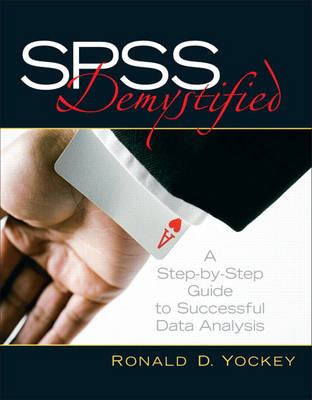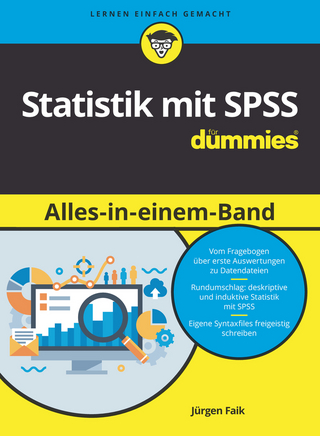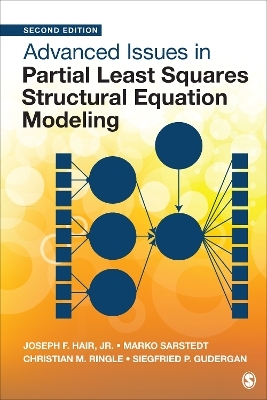
SPSS Demystified
Routledge (Verlag)
978-0-13-223885-4 (ISBN)
- Titel erscheint in neuer Auflage
- Artikel merken
Without question, statistics is one of the most challenging courses for students in the social and behavioral sciences. Enrolling in their first statistics course, students are often apprehensive or extremely anxious toward the subject matter. And while SPSS is one of the more easy-to-use statistical software programs available, for anxious students who realize they not only have to learn statistics but also new software, the task can seem insurmountable. Keenly aware of students’ anxiety with statistics (and the fact that this anxiety can affect performance), Ronald Yockey has written SPSS Demystified: A Step-by -Step Guide to Successful Data Analysis, 1/e. Through a comprehensive, step-by-step approach, this text is consistently and specifically designed to both alleviate anxiety toward the subject matter and build a successful experience analyzing data in SPSS.
Through a comprehensive, step-by-step approach, this text is consistently and specifically designed to both alleviate anxiety toward the subject matter and build a successful experience analyzing data in SPSS.
Chapter 1: Introduction
Starting SPSS
Data Editor Window
Variable View Window
Data View Window
Viewer (Output) window
Saving files
Printing files
Chapter Exercises
Chapter 2: Descriptive Statistics
Frequencies
Measures of Central Tendency
Analysis of Groups Using the Compare Means Procedure
Chapter Exercises
Chapter 3: Graphical Procedures
Bar Charts
Histograms
Scatterplots
Boxplots
Chapter Exercises
Chapter 4: Reliability Analysis
Example
Research Question
Data Entry and Analysis in SPSS
Chapter Exercises
Chapter 5: One Sample t Test
Example
Hypotheses and Research Question
Data Entry and Analysis in SPSS
Assumptions of the One Sample t Test
Chapter Exercises
Chapter 6: Independent Samples t Test
Example
Hypotheses and Research Question
Data Entry and Analysis in SPSS
Assumptions of the Independent Samples t Test
Chapter Exercises
Chapter 7: Dependent Samples t Test
Example
Hypotheses and Research Question
Data Entry and Analysis in SPSS
Assumptions of the Dependent Samples t Test
Chapter Exercises
Chapter 8: One—Way Between Subjects ANOVA
Example
Hypotheses and Research Question
Data Entry and Analysis in SPSS
Assumptions of the One—Way Between Subjects ANOVA
Chapter Exercises
Chapter 9: Two—Way Between Subjects ANOVA
Example
Hypotheses and Research Questions
Data Entry and Analysis in SPSS
Assumptions of the Two—Way Between Subjects ANOVA
Chapter Exercises
Chapter 10: One—Way Within Subjects ANOVA
Example
Hypotheses and Research Question
Data Entry and Analysis in SPSS
Assumptions of the One—Way Within Subjects ANOVA
Chapter Exercises
Chapter 11: One—Between One—Within Subjects ANOVA
Example
Hypotheses and Research Questions
Data Entry and Analysis in SPSS
Assumptions of the One—Between One—Within Subjects ANOVA
Chapter Exercises
Chapter 12: Correlation
Example
Hypotheses and Research Question
Data Entry and Analysis in SPSS
Assumptions of Correlation
Chapter Exercises
Chapter 13: Simple Regression
Example
Hypotheses and Research Question
Data Entry and Analysis in SPSS
Assumptions of Simple Regression
Chapter Exercises
Chapter 14: Multiple Regression
Example
Hypotheses and Research Questions
Data Entry and Analysis in SPSS
Assumptions of Multiple Regression
Chapter Exercises
Chapter 15: Chi—Square Goodness of Fit Test
Example
Hypotheses and Research Question
Data Entry and Analysis in SPSS
Assumptions of the Chi—Square Goodness of Fit Test
Chapter Exercises
Chapter 16: Chi—Square Test of Independence
Example
Hypotheses and Research Question
Data Entry and Analysis in SPSS
Assumptions of Chi—Square Test of Independence
Chapter Exercises
Appendix A: Data Transformations and Other Procedures
Appendix B: Importing Files
Appendix C: Solutions to Chapter Exercises
References
| Erscheint lt. Verlag | 29.11.2007 |
|---|---|
| Verlagsort | New York |
| Sprache | englisch |
| Maße | 279 x 219 mm |
| Gewicht | 646 g |
| Themenwelt | Mathematik / Informatik ► Mathematik ► Computerprogramme / Computeralgebra |
| Sozialwissenschaften ► Soziologie ► Empirische Sozialforschung | |
| ISBN-10 | 0-13-223885-3 / 0132238853 |
| ISBN-13 | 978-0-13-223885-4 / 9780132238854 |
| Zustand | Neuware |
| Haben Sie eine Frage zum Produkt? |
aus dem Bereich


